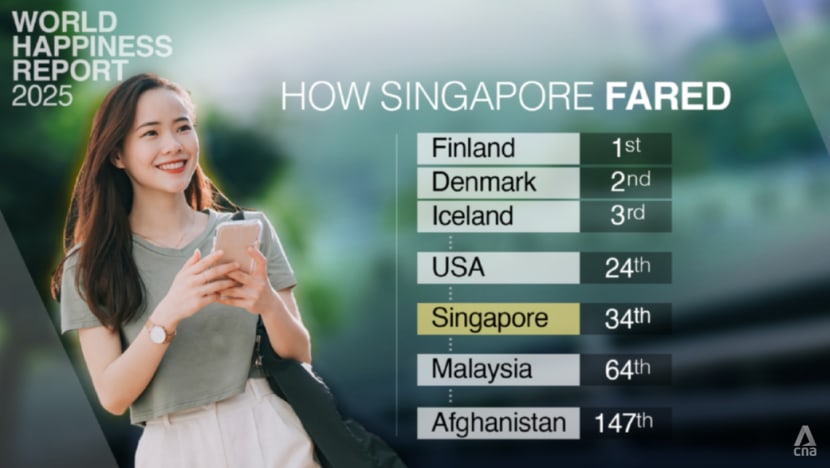Singapore slips in world happiness ranking, gets knocked off top spot in Asia
Top spots were dominated once again by Nordic countries, with Finland leading in first place for the 8th year running.


This audio is generated by an AI tool.
SINGAPORE: In 2024, Singaporeans were less happy than the past few years, according to the World Happiness Report.
The nation dropped four places to 34th in the global study released Thursday (Mar 20), which assessed the happiness index of 147 places around the world.
Singapore's current position – similar to its ranking in 2017 and 2018 – is the lowest since the first report was presented in 2012.
In 2023, Singapore took the 30th spot, making it the happiest nation in Asia.
This time, Singapore was dethroned by Taiwan, which is 27th on the list, said the study published by the University of Oxford, Gallup and the United Nations.
Assessments were made over a three-year average, and across six variables that include social support, GDP (gross domestic product) per capita, healthy life expectancy, freedom, generosity and perception of corruption.
Rankings were determined by more than 100,000 global respondents.
WHICH PLACES ARE HAPPY?
Top spots were dominated once again by Nordic countries, with Finland leading in first place for the 8th year running.
Denmark, Iceland, Sweden and the Netherlands rounded up the top five.
Among Southeast Asian nations, Thailand was at 49th, Philippines at 57th, Malaysia at 64th and Indonesia at 83rd.
Most places in East Asia dropped in rankings. Japan ranked 55th, compared to 51st the year before; South Korea slipped from 52nd to 58th, while China came in at 68th, down from 60th.
Elsewhere, the United States dropped a place to 24th – its lowest ranking yet, while Costa Rica (6th) and Mexico (10th) placed in the top 10 for the first time.

SHARING + CARING = HAPPINESS
The research found that sharing meals, trusting others and benevolent acts are strongly linked with wellbeing across all global regions.
It also showed that elements outside economic factors, such as family bonds, social support and community, can contribute to happiness.
Jan-Emmanuel De Neve, an editor of the report, pointed to Costa Rica and Mexico, which have achieved high rankings despite lower wealth compared to their counterparts in the top 10.
“They do not necessarily have the high-income GDP per capita and the redistribution through the welfare state. What they do have … (are) very strong family ties, so their immediate community is very strong,” said the economics professor at the University of Oxford.
However, the study also noted an increase in anxiety, worry and stress around the world.
Additionally, it found that social disconnection is prevalent among young adults.
In 2023, 19 per cent of youths across the world reported having no one that they could count on for social support, representing a 39 per cent increase compared to 2006.
HOW DID SINGAPORE FARE?
Among the six key factors used to analyse the data, perception of corruption in Singapore is the lowest in the world.
The nation also places 24th in terms of generosity, assessed by monthly charitable donations.
But Singapore's ranking was dragged down by perceived social support and freedom, in which respondents could have felt they may not get as much help as they need from relatives or friends, and are also not as satisfied with the freedom of life choices.
Mr Melvin Tay of the Institute of Policy Studies' Social Lab said research done at the think tank has shown that the average number of close friends for Singaporeans has dipped, from about 10 in 2018 to around six in 2024.
“Social connections significantly influence our happiness. This is especially so among youths who report higher anxiety and lower satisfaction levels in reduced social networks,” the research associate said.
“As human beings, we seek companionship and emotional support. When these relationships weaken, individuals would feel more susceptible to mental health issues, anxiety, and depression, contributing to reduction in happiness.”
While Singapore still leads in Southeast Asia, Mr Tay noted that the nation’s happiness levels seem to have plateaued.
Neighbours are closing the gap, with Vietnam in particular making notable gains from 96th in 2015 to 46th last year.
“This suggests that perhaps some form of robust social cohesion, social support, can significantly enhance happiness, even with lower baseline GDP levels,” he told CNA's Singapore Tonight programme.
He added there is room for improvement in non-economic factors such as work-life balance and community support.
He echoed the study’s findings on the correlation between kindness and happiness.
“We do see studies consistently linking pro-social behaviours such as … donating to a cause, volunteering, helping a stranger … these improve mental health, reduce anxiety, and increase life satisfaction,” he said.
“Knowing or perceiving that positive impact (of pro-social acts) contributes to your own satisfaction or happiness too.”












.jpg?itok=h-d3G20X)





